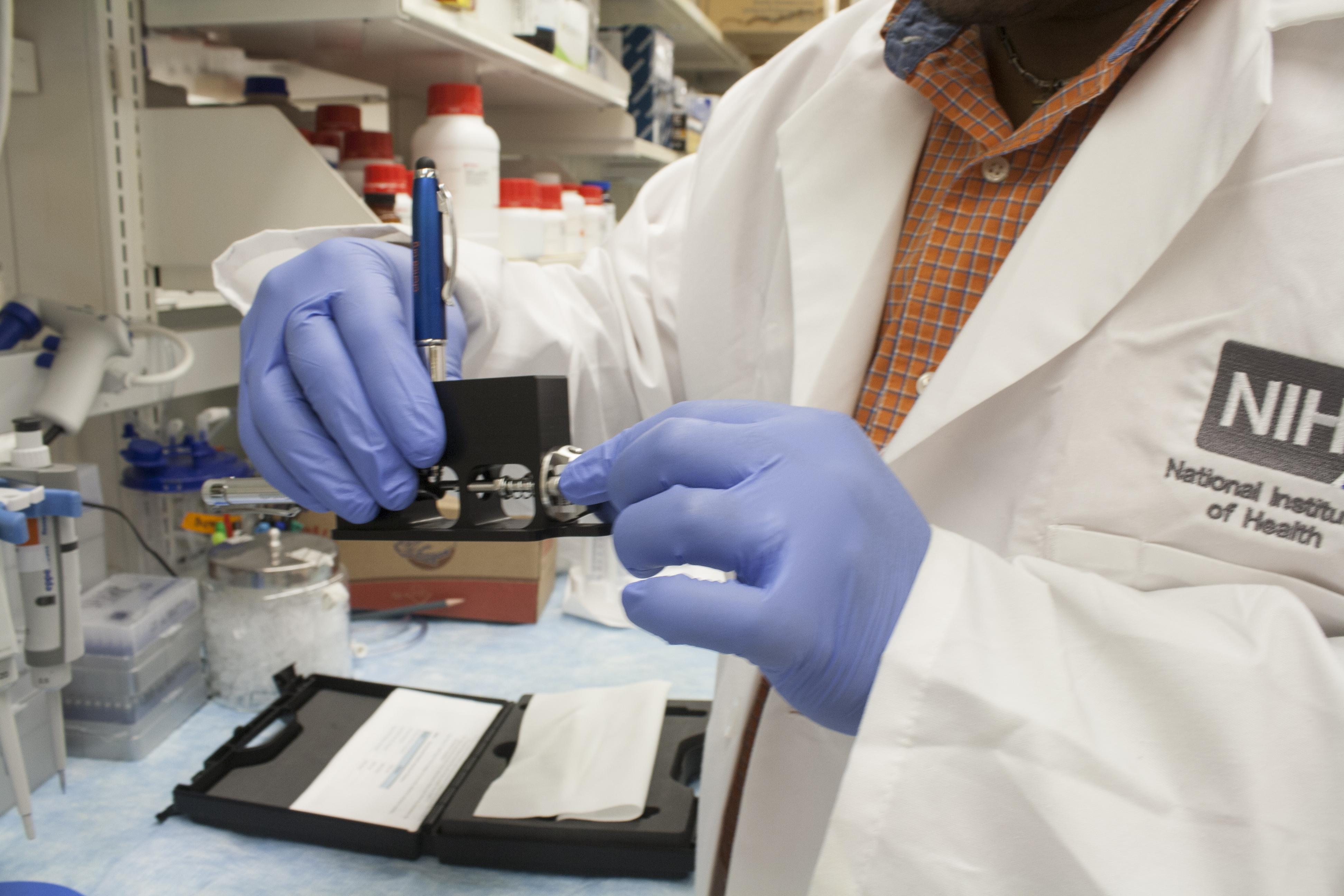The Neuro-Oncology Branch hosts a variety of transdisciplinary trainees who presented their work at a national neuro-oncology conference.
By Neuro-Oncology Branch Staff
December 15, 2021
The NCI Center for Cancer Research's Neuro-Oncology Branch (NOB) is proud to host a variety of transdisciplinary trainees, each working toward the goal of improving outcomes for people living with a brain or spine tumor. The branch currently has 52 trainees, representing nearly half of the department.
Training programs at the NOB include summer internships, postbaccalaureate programs, a graduate partnership program, postdoctoral training programs, research fellowships, and clinical fellowships.
- The Translational Research Immersion Program (TRIP) is designed to immerse interns in the patient-centered research conducted within the NOB. Interns observe and engage with clinical and laboratory professionals who lead clinical, translational, and basic research.
- The Postbaccalaureate Intramural Research Training Award Program (Postbac IRTA/CRTA) is a biomedical research program that enables recent college graduates who are planning to apply to graduate or professional school to spend one or two years working with investigators at NIH.
- The Graduate Partnerships Program (GPP) provides graduate students the opportunity to conduct all (or part) of their dissertation research in the resource-rich NIH environment.
- The Postdoctoral Training in the NIH Intramural Research Program provides those who have recently received a doctoral degree the opportunity to come to NIH to complete up to five years of postdoctoral research. After reaching this five-year limit, individuals can spend up to an additional three years at NIH as a research fellow—an appointment that makes them NIH employees.
- The Neuro-Oncology Fellowship Program is a joint fellowship program between the NOB and Johns Hopkins University. The goal is to prepare neurologists, medical oncologists, radiation oncologists, and neurosurgeons for research careers in neuro-oncology.
While at the NOB, trainees gain experience in many different areas of neuro-oncology. With the guidance of mentors from different teams within the NOB, they work in the laboratory and clinic on various research projects. They also have the opportunity to share their work at national conferences—and make connections that can lead to new discoveries.
Mark Gilbert, M.D., and Terri Armstrong, Ph.D., NOB chief and deputy chief, respectively, state that: “One of the most important missions of the NOB is to provide training and mentorship to people early in their careers. We hope that their experience with our group will encourage them to choose neuro-oncology and to provide the field with potential future leaders.”
2021 SNO Presentations
Last month, NOB trainees presented virtual posters at the 26th Annual Meeting of the Society for Neuro-Oncology (SNO). Links to the trainees' abstract presentations are provided below.
Bioinformatics Team
TRANSCRIPT: a cenTRAl Nervous System Cancer clinical tRIals PostmorTem
Yeonju Kim
Read the full report >
Cancer Stem Cell Biology Team
Targeted inhibition of CDK5-mediated regulation of human endogenous retrovirus K (HML-2) envelope protein in atypical teratoid rhabdoid tumor
Tara Doucet-O'Hare, Ph.D.
Read the full report >
Genomics Team
NRF2-guided glutathione synthesis is an essential metabolic pathway in IDH1-mutated glioma
Yang Liu, Ph.D.
Read the full report >
Metabolomics Team
Cysteine is a limiting factor for glioma proliferation and survival*
*Received the Electronic Poster Award
Victor Ruiz Rodado, Ph.D.
Read the full report >
APOLLO: rAman-based PathOlogy of malignant gliOma
Adrian Lita, Ph.D.
Read the full report >
Stearoyl-CoA desaturase 1 is essential for the growth of IDH mutant glioma
Tomohiro Yamasaki, M.D., Ph.D.
Read the full report >
Patient Outcomes Team
Exploring Patient Reported Outcomes (PROs) across ethnoracial groups in Primary Brain Tumor (PBT) patients: Differences in the illness experience
Amanda King, Ph.D.
Read the full report >
Relationships between mood disturbance, symptom interference, and disease progression in glioma patients
Kayla Roche
Read the full report >
An innovative virtual multi-institutional, multidisciplinary neuro-oncology tumor board: the NIH-NOB experience during the COVID-19 pandemic
James Rogers
Read the full report >
Evaluation of Financial Toxicity (FT) in people with rare Central Nervous System (CNS) tumors using an innovative web-based study design
Michael Timmer
Read the full report >
Feasibility and utility of the Montreal Cognitive Assessment in routine clinical exams and telehealth visits in Neuro-Oncology
Varna Jammula
Read the full report >
Association of circadian clock gene expression with glioma tumor microenvironment and patient survival
Julianie De La Cruz Minyety
Read the full report >
Histological analysis of sleep and circadian brain circuitry in Cranial Radiation-Induced Hypersomnolence (C-RIH) mouse model
Dorela Shuboni-Mulligan, Ph.D.
Read the full report >
Translational Research Team
Combined TOP1 and PARP inhibition enforces genomic instability and cell death in PTEN-deficient glioblastoma
Olga Kim, Ph.D., M.D.
Read the full report >
Introduction to Career Pathways in Neuro-Oncology Event
Given the rapid expansion of the neuro-oncology field over the past few decades, training highly specialized neuro-oncology professionals is critical. The NOB has partnered with SNO to offer trainees of all disciplines the opportunity to learn about neuro-oncology careers in basic science, clinical care, and research.
The free virtual event, called "Introduction to Career Pathways in Neuro-Oncology," was held held on January 11, 2022, and offered insights from world-renowned neuro-oncology professionals, opportunities, and strategies to expand a neuro-oncology career. A post-session panel discussion allowed attendees to share their thoughts with experts.
